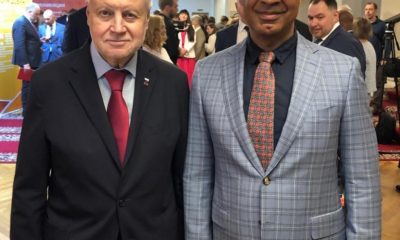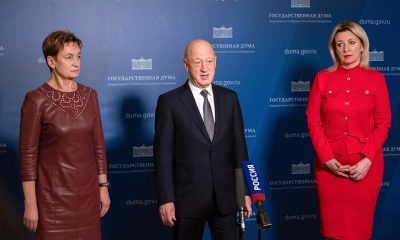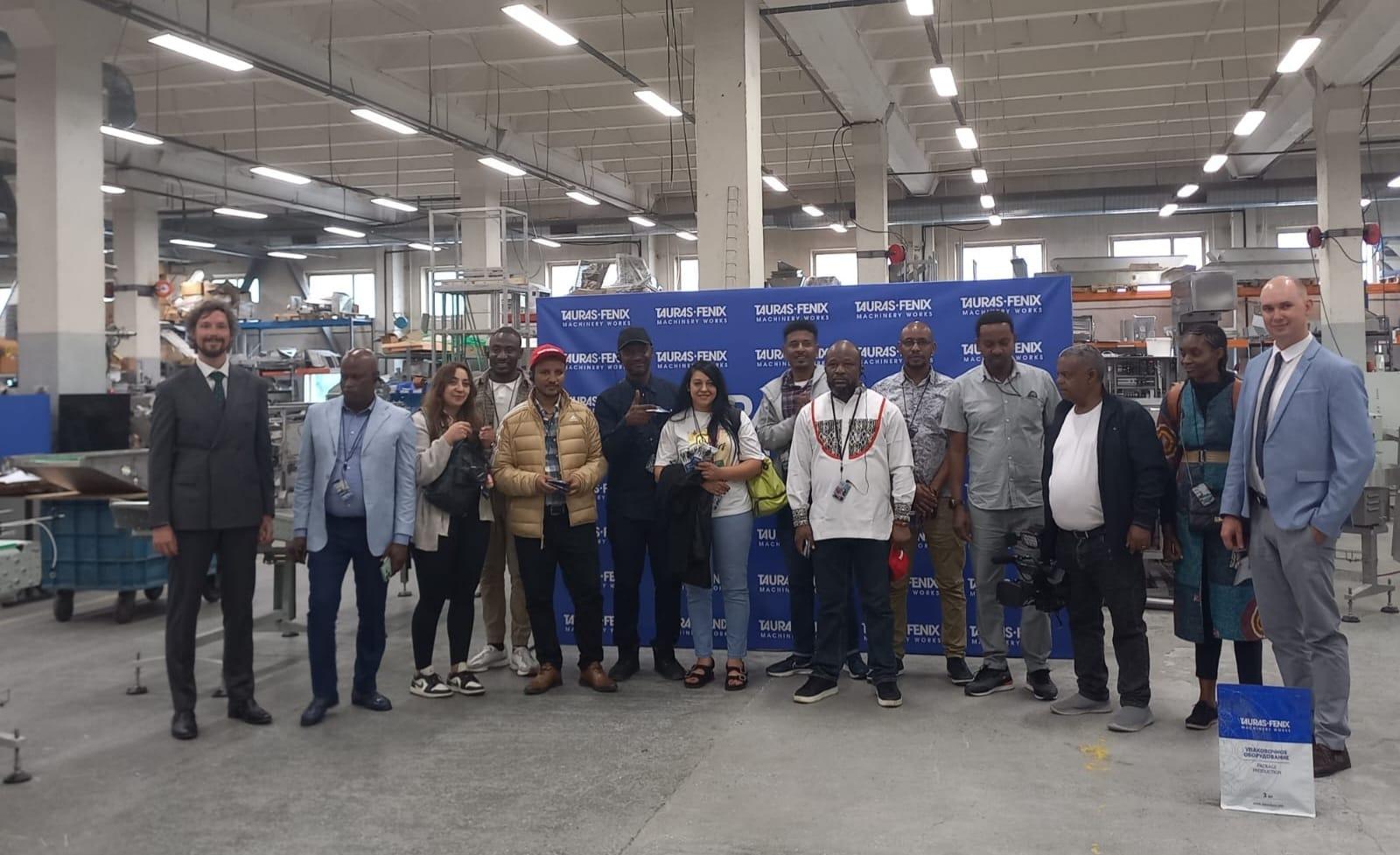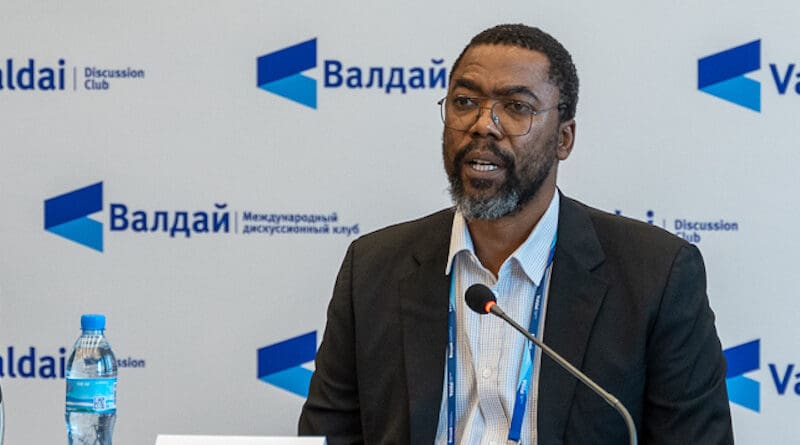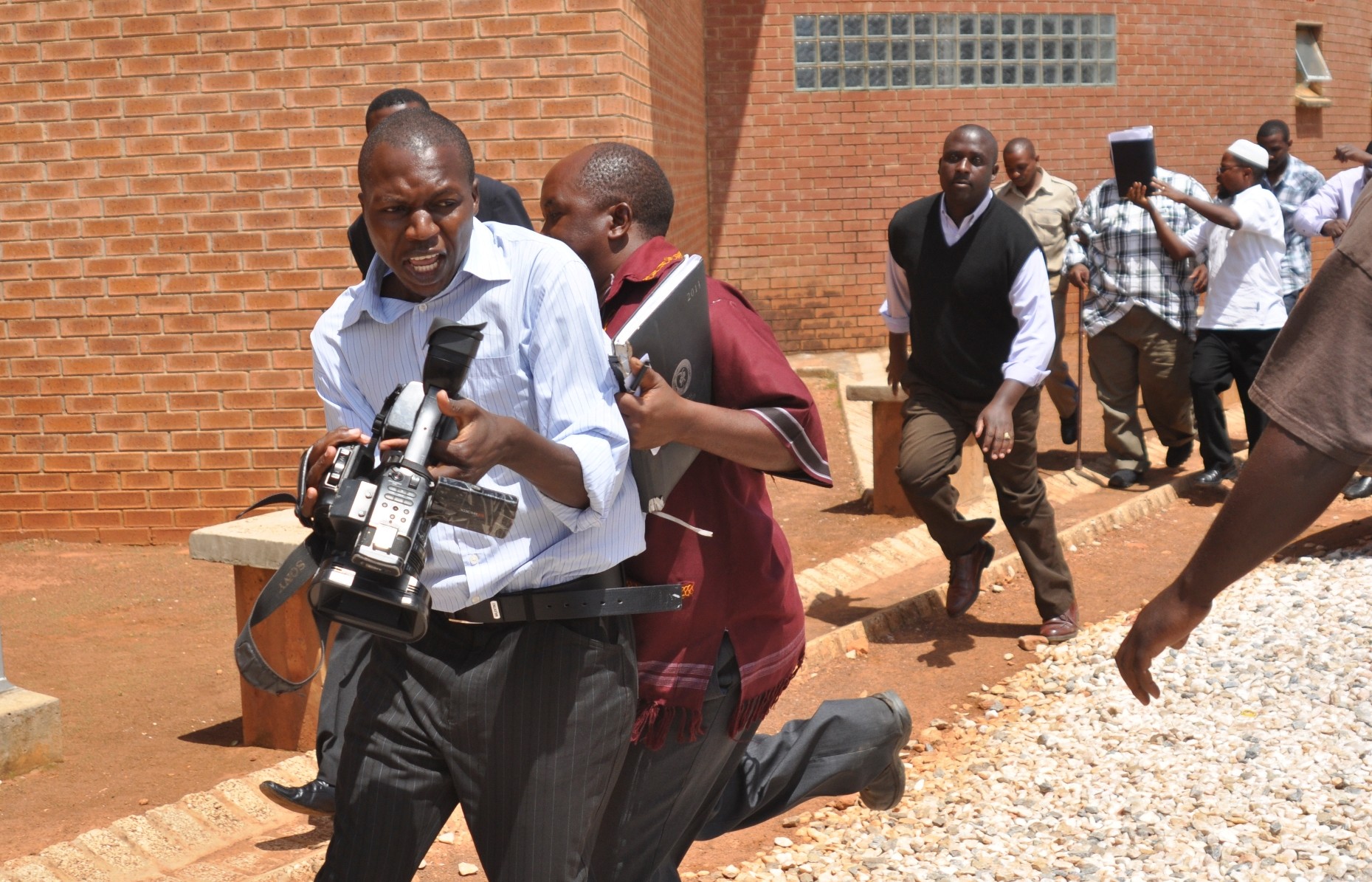World
Russian, African Journalists Discuss Great Personalities in Russian-African Relations History
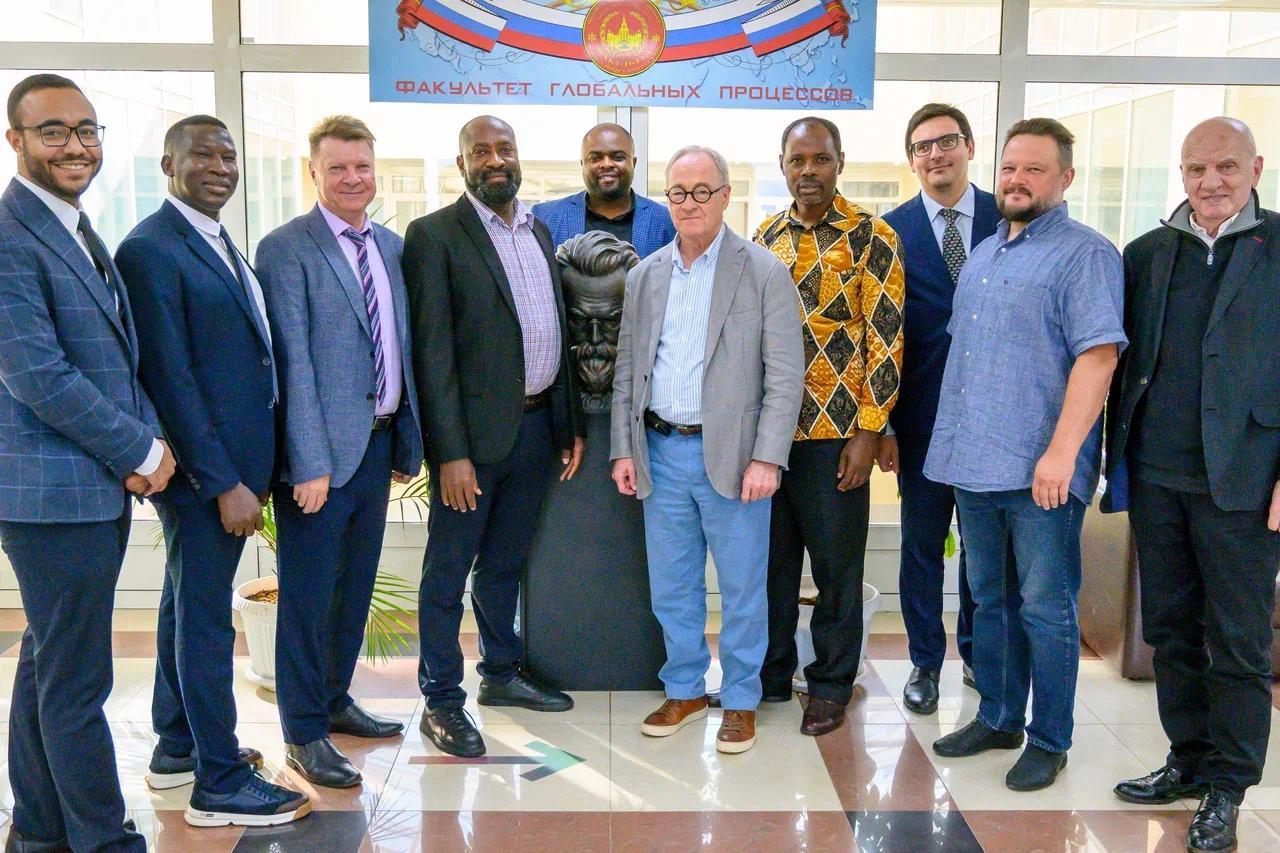
By Kestér Kenn Klomegâh
A roundtable of laureates of the first International Contest of Russian and African Journalists: “Great Personalities in the History of Russian-African Relations”, timed to coincide with the 225thanniversary of A.S. Pushkin’s birth, was held on July 31, 2024. The round table was organized by the Russian-African Club of Lomonosov Moscow State University in partnership with the Union of Journalists of Russia, the Faculty of Journalism and the Faculty of Global Studies of Lomonosov Moscow State University with the support of the Secretariat of the Russia-Africa Partnership Forum (Ministry of Foreign Affairs of Russia).
The speakers of the round table were award-winning contestants, diplomats, media top managers, producers, TV presenters, journalists, public figures, scientists, teachers, and culture and mass media representatives of Russia and African countries.
The contribution of outstanding personalities to the development of relations between Russia and African countries in the works of the contest winners was discussed in the course of the round table. The participants put forward ideas and proposals to popularize knowledge in Russia and Africa about significant persons who contributed to the strengthening of Russian-African relations. They also discussed preparations for the second International contest for Russian and African journalists on the topic: “Short video stories about landmarks of your country”, dedicated to the 270th anniversary of Moscow University. The meeting was held in Russian, English, French and Arabic.
Timur Shafirа, Secretary of the Union of Journalists of Russia, addressed the participants with his welcoming speech. He expressed confidence that events like this contest are of great importance in strengthening relations between nations. In his opinion, journalists are civil diplomats, helping to build constructive partnerships and preserve stability and cooperation.
Anna Gladkova, Deputy Dean for International Cooperation of the Faculty of Journalism of Lomonosov Moscow State University, in her speech, conveyed greetings to the participants from Elena Vartanova, Dean of the Faculty of Journalism of MSU. The speaker also emphasized the special importance of holding this contest on the anniversary of the great genius of Russian poetry Alexander Pushkin and wished further success to the project.
The winner of the contest, a student of the University of International Relations from Cameroon Danielle Juanita Kabeyene told about her article, which she dedicated to the modern Togolese public and political figure, president of the “League for the Defense of Black Africans” Egountchi Behanzin. Winning such a prestigious competition is a great honour, Danielle noted.
Hafiz Basi from Sudan, who also won the contest, wrote an article about Alexander Pushkin, as he considers the great poet to be a true symbol who combined a true love for Russia and Africa. Hafiz noted that the poet never forgot his African roots, which can be proved by many lines from his poems. At the same time, Africa has always known and remembered Pushkin. Many generations of Africans got acquainted with the great Russian literature through Pushkin’s works. Hafiz also told his second article about Pushkin’s ancestor – Abram Petrovich Hannibal who was African. According to the contestant, this bright man also became a symbol of historical relations between Russia and Africa.
Christian Mounene, a laureate from the Democratic Republic of Congo, wrote an article about Patrice Lumumba for the contest, as he considers him a man of great stature, one of the most prominent fighters against colonialism, who stood up for the rights of Africans and expressed the aspirations of African peoples to rapprochement with the USSR and Russia.
The contestant from Senegal, Abdou Karim Diakhate, editor-in-chief of Le Panafricain magazine, who also won the competition, wrote an article about the Senegalese writer and film director Sembene Ousmane, who made a great contribution to awakening Africans in their struggle for independence.
Another contestant from Russia, Anastasia Zapolskaya, called her award-winning article “Sergey Lavrov – the face of Russian diplomacy in the 21st century”. Anastasia said that she was particularly interested in the role of diplomacy in modern world processes. She is sure that Sergei Lavrov, as Russian Foreign Minister, makes a huge contribution to building a just world order based on multipolarity and equality.
The main character of the article by the award-winning contest from South Africa, Khola Kesva, was a prominent military and political leader from Mozambique, Samora Machel, a revolutionary who waged an active guerrilla struggle against the colonizers in close cooperation with the USSR and later became President of Mozambique.
Yves Ekoué Amaïzo, Director of the Afrocentrism think tank from Togo, noted that when writing the article for the contest, he was guided by the idea that there were and are many ordinary people from different countries who make their huge contribution to strengthening ties between Russia and Africa, but their activities are hardly covered in the media. The contest winner expressed the opinion that it is ordinary people working in the Russia-Africa agenda who are the foundation on which strong friendly relations are built day by day.
This idea was supported by a round-table participant from Rwanda, Chairman of the Board of the African Diaspora Union for Truth and Advancement of People of African Descent “Inganzo Gakondo” François-Xavier Tulikunkiko. He noted that there are various Russian-African organizations in many cities in Russia where many things are being done to strengthen relations between Russia and Africa. Besides, a very large number of university graduates from the USSR and Russia now live in almost all African countries, and many of them hold significant positions. The speaker suggested that graduates should be regularly involved in such competitions.
Ilya Shershnev, Program Director of the Russian-African Club of Lomonosov Moscow State University, Associate Professor of the Faculty of Global Studies of Moscow State University, noted the important work of university ambassadors – alumni as “envoys” and “ambassadors” of universities in Russia and Africa. In recent years, university ambassadors have appeared in many Russian and foreign universities, they are actively deploying their activity abroad. The geographical expansion of this journalistic contest will largely depend on university ambassadors and their personal relations and contacts.
Zenebe Kinfu, President of the Union of African Diasporas, joined his colleagues’ opinion and called on all organizations active in the field of relations between Russia and Africa to stand together and work on a united front.
President of the Cameroon Diaspora and the round table moderator, Louis Gowend, who is also the Director for African Diasporas and Media at the Russian-African Club of the Lomonosov MSU, stressed that African alumni and Russian-African organizations should become the foundation for relations between Russia and Africa to be built on.
Daniel Sawadogo, Cultural Relations Attaché at the Embassy of Burkina Faso, emphasized the importance of the international journalism contest and called for such contests to be held as often as possible. According to the diplomat, it is necessary for close cooperation between African countries and Russia. Mr. Sawadogo called the journalists’ contest a brilliant success of the MSU Russian-African Club.
Sergey Chesnokov, permanent expert of the Russian-African Club of Lomonosov Moscow State University, international journalist, and academician of PANI, proposed to create branches of the club in African countries. In the expert’s opinion, this would contribute to even closer interaction and would allow us to receive information and exchange opinions with African experts.
Summarizing the round table, Alexander F. Berdnikov, Executive Secretary of the Russian-African Club of MSU, supported the need for interaction between the African diaspora established in Russia and alumni located in African countries. According to him, this contest promotes the establishment of such ties. He suggested publishing a collection of articles written by all participants of the journalism contest and organizing the next contest together with other universities that are also working to strengthen ties between Russia and Africa.
World
Today’s Generation of Entrepreneurs Value Flexibility, Autonomy—McNeal-Weary

By Kestér Kenn Klomegâh
The Young African Leaders Initiative (YALI) is the United States’ signature step to invest in the next generation of African leaders. Since its establishment in 2010 by Obama administration, YALI has offered diverse opportunities, including academic training in leadership, governance skills, organizational development and entrepreneurship, and has connected with thousands of young leaders across Africa. This United States’ policy collaboration benefits both America and Africa by creating stronger partnerships, enhancing mutual prosperity, and ensuring a more stable environment.
In our conversation, Tonya McNeal-Weary, Managing Director at IBS Global Consulting, Inc., Global Headquarters in Detroit, Michigan, has endeavored to discuss, thoroughly, today’s generation of entrepreneurs and also building partnerships as a foundation for driving positive change and innovation in the global marketplace. Here are the excerpts of her conversation:
How would you describe today’s generation of entrepreneurs?
I would describe today’s generation of entrepreneurs as having a digital-first mindset and a fundamental belief that business success and social impact can coexist. Unlike the entrepreneurs before them, they’ve grown up with the internet as a given, enabling them to build global businesses from their laptops and think beyond geographic constraints from day one. They value flexibility and autonomy, often rejecting traditional corporate ladders in favor of building something meaningful on their own terms, even if it means embracing uncertainty and financial risk that previous generations might have avoided.
And those representing the Young African Leaders Initiative, who attended your webinar presentation late January 2026?
The entrepreneurs representing the Young African Leaders Initiative are redefining entrepreneurship on the continent by leveraging their unique perspectives, cultural heritage, and experiences. Their ability to innovate within local contexts while connecting to global opportunities exemplifies how the new wave of entrepreneurs is not confined by geography or conventional expectations.
What were the main issues that formed your ‘lecture’ with them, Young African Leaders Initiative?
The main issues that formed my lecture for the Young African Leaders Initiative were driven by understanding the importance of building successful partnerships when expanding into the United States or any foreign market. During my lecture, I emphasized that forming strategic alliances can help entrepreneurs navigate unfamiliar business environments, access new resources, and foster long-term growth. By understanding how to establish strong and effective partnerships, emerging leaders can position their businesses for sustainable success in global markets. I also discussed the critical factors that contribute to successful partnerships, such as establishing clear communication channels, aligning on shared goals, and cultivating trust between all parties involved. Entrepreneurs must be proactive in seeking out partners who complement their strengths and fill gaps in expertise or resources. It is equally important to conduct thorough due diligence to ensure that potential collaborators share similar values and ethical standards. Ultimately, the seminar aimed to empower YALI entrepreneurs with practical insights and actionable strategies for forging meaningful connections across borders. Building successful partnerships is not only a pathway to business growth but also a foundation for driving positive change and innovation in the global marketplace.
What makes a ‘leader’ today, particularly, in the context of the emerging global business architecture?
In my opinion, a leader in today’s emerging global business architecture must navigate complexity and ambiguity with a fundamentally different skill set than what was previously required. Where traditional leadership emphasized command-and-control and singular vision, contemporary leaders succeed through adaptive thinking and collaborative influence across decentralized networks. Furthermore, emotional intelligence has evolved from a soft skill to a strategic imperative. Today, the effective modern leader must possess deep cross-cultural intelligence, understanding that global business is no longer about exporting one model worldwide but about genuinely integrating diverse perspectives and adapting to local contexts while maintaining coherent values.
Does multinational culture play in its (leadership) formation?
I believe multinational culture plays a profound and arguably essential role in forming the kind of leadership required in today’s global business environment. Leaders who have lived, worked, or deeply engaged across multiple cultural contexts develop a cognitive flexibility that’s difficult to replicate through reading or training alone. More importantly, multinational exposure tends to dismantle the unconscious certainty that one’s own way of doing things is inherently “normal” or “best.” Leaders shaped in multicultural environments often develop a productive discomfort with absolutes; they become more adept at asking questions, seeking input, and recognizing blind spots. This humility and curiosity become strategic assets when building global teams, entering new markets, or navigating geopolitical complexity. However, it’s worth noting that multinational experience alone doesn’t automatically create great leaders. What matters is the depth and quality of cross-cultural engagement, not just the passport stamps. The formation of global leadership is less about where someone has been and more about whether they’ve developed the capacity to see beyond their own cultural lens and genuinely value differences as a source of insight rather than merely tolerating them as an obstacle to overcome.
In the context of heightening geopolitical situation, and with Africa, what would you say, in terms of, people-to-people interaction?
People-to-people interaction is critically important in the African business context, particularly as geopolitical competition intensifies on the continent. In this crowded and often transactional landscape, the depth and authenticity of human relationships can determine whether a business venture succeeds or fails. I spoke on this during my presentation. When business leaders take the time for face-to-face meetings, invest in understanding local priorities rather than imposing external agendas, and build relationships beyond the immediate transaction, they signal a different kind of partnership. The heightened geopolitical situation actually makes this human dimension more vital, not less. As competition increases and narratives clash about whose model of development is best, the businesses and nations that succeed in Africa will likely be those that invest in relationships characterized by reciprocity, respect, and long-term commitment rather than those pursuing quick wins.
How important is it for creating public perception and approach to today’s business?
Interaction between individuals is crucial for shaping public perception, as it influences views in ways that formal communications cannot. We live in a society where word-of-mouth, community networks, and social trust areincredibly important. As a result, a business leader’s behavior in personal interactions, their respect for local customs, their willingness to listen, and their follow-through on commitments have a far-reaching impact that extends well beyond the immediate meeting. The geopolitical dimension amplifies this importance because African nations now have choices. They’re no longer dependent on any single partner and can compare approaches to business.
From the above discussions, how would you describe global business in relation to Africa? Is it directed at creating diverse import dependency?
While it would be too simplistic to say global business is uniformly directed at creating import dependency, the structural patterns that have emerged often produce exactly that outcome, whether by design or as a consequence of how global capital seeks returns. Global financial institutions and trade agreements have historically encouraged African nations to focus on their “comparative advantages” in primary commodities rather than industrial development. The critical question is whether global business can engage with Africa in ways that build productive capacity, transfer technology, develop local talent, and enable countries to manufacture for themselves and for export—or whether the economic incentives and power irregularities make this structurally unlikely without deliberate policy intervention.
World
Russia Expands Military-Technical Cooperation With African Partners

By Kestér Kenn Klomegâh
Despite geopolitical complexities, tensions and pressure, Russia’s military arms and weaponry sales earned approximately $15 billion at the closure of 2025, according to Kremlin report. At the regular session, chaired by Russian President Vladimir Putin on Jan. 30, the Commission on Military and Technical Cooperation with Foreign Countries analyzed the results of its work for 2025, and defined plans for the future.
It was noted that the system of military-technical cooperation continued to operate in difficult conditions, and with increased pressure from the Western countries to block business relations with Russia. The meeting, however, admitted that export contracts have generally performed sustainably. Russian military products were exported to more than 30 countries last year, and the amount of foreign exchange exceeded $15 billion.
Such results provide an additional opportunity to direct funds to the modernization of OPC enterprises, to the expansion of their production capacities, and to advanced research. It is also important that at these enterprises a significant volume of products is civilian products.
The Russian system of military-technical cooperation has not only demonstrated effectiveness and high resilience, but has created fundamental structures, which allow to significantly expand the “geography” of supplies of products of military purpose and, thus strengthen the position of Russia’s leader and employer advanced weapons systems – proven, tested in real combat conditions.
Thanks to the employees of the Federal Service for Military Technical Cooperation and Rosoboronexport, the staff of OPC enterprises for their good faith. Within the framework of the new federal project “Development of military-technical cooperation of Russia with foreign countries” for the period 2026-2028, additional measures of support are introduced. Further effective use of existing financial and other support mechanisms and instruments is extremely important because the volumes of military exports in accordance with the 2026 plan.
Special attention would be paid to the expansion of military-technological cooperation and partnerships, with 14 states already implementing or in development more than 340 such projects.
Future plans will allow to improve the characteristics of existing weapons and equipment and to develop new promising models, including those in demand on global markets, among other issues – the development of strategic areas of military-technical cooperation, and above all, with partners on the CIS and the CSTO. This is one of the priority tasks to strengthen both bilateral and multilateral relations, ensuring stability and security in Eurasia.
From January 2026, Russia chairs the CSTO, and this requires working systematically with partners, including comprehensive approaches to expanding military-technical relations. New prospects open up for deepening military-technical cooperation and with countries in other regions, including with states on the African continent. Russia has been historically strong and trusting relationships with African countries. In different years even the USSR, and then Russia supplied African countries with a significant amount of weapons and military equipment, trained specialists on their production, operation, repair, as well as military personnel.
Today, despite pressure from the West, African partners express readiness to expand relations with Russia in the military and military-technical fields. It is not only about increasing supplies of Russian military exports, but also about the purchase of other weapons, other materials and products. Russia has undertaken comprehensive maintenance of previously delivered equipment, organization of licensed production of Russian military products and some other important issues. In general, African countries are sufficient for consideration today.
World
Trump Picks Kevin Warsh to Succeed Jerome Powell as Federal Reserve Chair
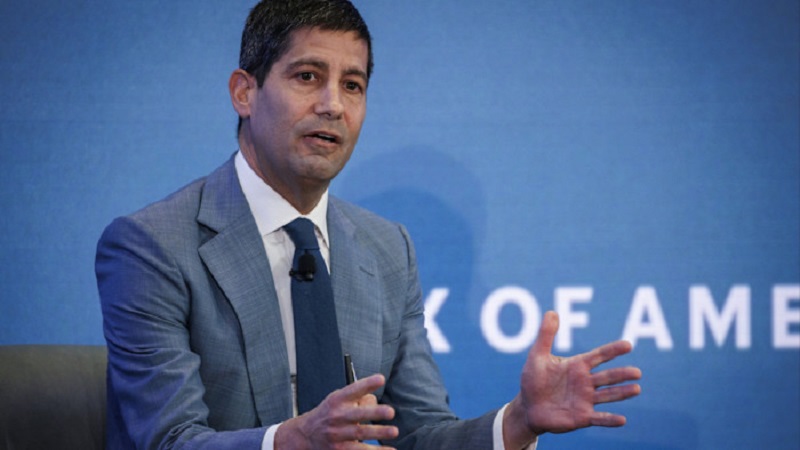
By Adedapo Adesanya
President Donald Trump has named Mr Kevin Warsh as the successor to Mr Jerome Powell as the Federal Reserve chair, ending a prolonged odyssey that has seen unprecedented turmoil around the central bank.
The decision culminates a process that officially began last summer but started much earlier than that, with President Trump launching a criticism against the Powell-led US central bank almost since he took the job in 2018.
“I have known Kevin for a long period of time, and have no doubt that he will go down as one of the GREAT Fed Chairmen, maybe the best,” Mr Trump said in a Truth Social post announcing the selection.
US analysts noted that the 55-year old appear not to ripple market because of his previous experience at the apex bank as Governor, with others saying he wouldn’t always do the bidding of the American president.
If approved by the US Senate, Mr Warsh will take over the position in May, when Mr Powell’s term expires.
Despite having argued for reductions recently, “Warsh has a long hawkish history that markets have not forgotten,” one analyst told Bloomberg.
President Trump has castigated Mr Powell for not lowering interest rates more quickly. His administration also launched a criminal investigation of Powell and the Federal Reserve earlier this month, which led Mr Powell to issue an extraordinary rebuke of President Trump’s efforts to politicize the independent central bank.
-

 Feature/OPED6 years ago
Feature/OPED6 years agoDavos was Different this year
-
Travel/Tourism9 years ago
Lagos Seals Western Lodge Hotel In Ikorodu
-

 Showbiz3 years ago
Showbiz3 years agoEstranged Lover Releases Videos of Empress Njamah Bathing
-

 Banking8 years ago
Banking8 years agoSort Codes of GTBank Branches in Nigeria
-

 Economy3 years ago
Economy3 years agoSubsidy Removal: CNG at N130 Per Litre Cheaper Than Petrol—IPMAN
-

 Banking3 years ago
Banking3 years agoSort Codes of UBA Branches in Nigeria
-

 Banking3 years ago
Banking3 years agoFirst Bank Announces Planned Downtime
-

 Sports3 years ago
Sports3 years agoHighest Paid Nigerian Footballer – How Much Do Nigerian Footballers Earn


